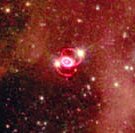 Den' rozhdeniya Sverhnovoi !
Den' rozhdeniya Sverhnovoi !24.02.2006 0:35 | O. S. Bartunov/GAISh, Moskva
23 fevralya - den' rozhdeniya Sverhnovoi 1987A, kotoraya byla otkryta Sheltonom (Ian Shelton) na plastinke. poluchennoi na 0.25 metrovom astrografe observatorii Las Campanas v Bol'shom Magellanovom oblake, kotoroe proizoshlo primerno 169,000 let nazad. Na samom dele, my poluchili cirkulyar IAU Circular No.4316 ot 24 fevralya:
W. Kunkel and B. Madore, Las Campanas Observatory, report the
discovery by Ian Shelton, University of Toronto Las Campanas
Station, of a mag 5 object, ostensibly a supernova, in the Large
Magellanic Cloud at R.A. = 5h35m.4, Decl. = -69 16' (equinox 1987.2), 18'
west and 10' south of 30 Dor and possibly involved with the
association NGC 2044. The discovery was made around Feb. 24.23 UT on
a 3-hr exposure with a 0.25-m astrograph beginning on Feb. 24.06,
and the object had evidently brightened by at least about 8 mag since
the previous night. An independent suspected sighting was made
visually by Oscar Duhalde, also at Las Campanas, around Feb. 24.2.
The object had brightened to about mag 4.5 by Feb. 24.33.
F. M. Bateson, Royal Astronomical Society of New Zealand,
informs us that the object was discovered independently by Albert
Jones, Nelson, on Feb. 24.37 UT (position R.A. = 5h35m.8, Decl. = -69 18',
equinox 1950.0) at mag 6.5-7.0 (in clouds); he estimated mv = 5.1
on Feb. 24.46. B. Moreno and S. Walker, Auckland Observatory,
obtained V = 4.81, B-V = +0.085, U-B = -0.836 on Feb. 24.454 UT.
R. H. McNaught, Siding Spring Observatory, communicates the
following visual magnitude estimates by G. Garradd (G) and himself
(M): Feb. 24.455, 4.8 (M); 24.472, 4.8 (M); 24.635, 4.4 (G);
24.679, 4.5 (M); 24.717, 4.4 (M). McNaught obtained the following
precise position with the University of Aston Hewitt Satellite
Schmidt camera: R.A. = 5h35m50s.22, Decl. = -69 17'59".2 (equinox
1950.0, uncertainty 2"). The object appears on films from the
previous night: Feb. 23.443, 6.0; 23.445, 6.2. He also notes the
position of a blue star, of mv about 12 and not obviously variable
during the past century (through Feb. 22.4): R.A. = 5h35m50s.12, Decl. =
-69 17'58".0 (equinox 1950.0; x = 15447, y = 9261 in the Harvard
LMC system). Films by Garradd confirm that the field was
identical down to mag 14.5 on Jan. 24 and Feb. 22.
B. Warner, University of Texas, reports that a spectroscopic
observation by J. Menzies on Feb. 24.9 UT with the 1.9-m reflector
at the South African Astronomical Observatory shows the 615-nm
dip, indicating that the object may be a supernova of type I.
Odnako, v cirkulyare IAU 4323
bylo ukazano, chto neitrinnyi signal byl zafiksirovan 23 fevralya:
C. Castagnoli, Istituto di Cosmogeofisica, Turin, telexes: "A
signal was detected on Feb. 23.124 UT at the Mont Blanc Neutrino
Observatory. The signal consists of five pulses, above the 7-MeV
energy threshold over an interval of 7 seconds. This is in agreement,
both in energy and duration, with predictions of collapsing
iron-core standard models at 50 kpc. The probability of a random
occurrence with SN 1987A is 1 per 10**4 yr.
Rozhdenie Sverhnovoi - eto samo po sebe zamechatel'noe yavlenie, no zdes' astronomy znali zvezdu, kotoraya vzorvalas' kak sverhnovaya - eto golubaya zvezda massoi okolo 20 mass solnca Sandulik(Sanduleak)-69°202. Osnovnaya intriga - chto ostalos' posle vzryva, prodolzhaet volnovat' astronomov, tak kak do sih por ne vidno neitronnuyu zvezdu, kotoruyu predskazyvaet teoriya dlya Sverhnovyh II tipa. To, chto my do sih por ne vidim neitronnuyu zvezdy, mozhno ob'yasnit' tem, chto libo ona ne "natyagivaet" na sebya dostatochno veshestva, chtoby byt' vidimoi s zemli, libo ona slishkom mnogo ego nabrala i kollapsirovala v chernuyu dyru. My vse nadeemsya, chto intriga dolzhna razreshit'sya v blizhaishie gody.
Do sih por, samoi blizkoi byla Sverhnovaya Keplera 1604 goda (sm. podrobnosti v obzore ob istoricheskih sverhnovyh).
Na nashem servere opublikovany materialy, posvyashennye etomu zamechatel'nomu yavleniyu, kotoroe mnogie nazyvayut sobytiem veka.
|
Publikacii s klyuchevymi slovami:
Sverhnovye - SN 1987a
Publikacii so slovami: Sverhnovye - SN 1987a | |
Sm. takzhe:
Vse publikacii na tu zhe temu >> | |